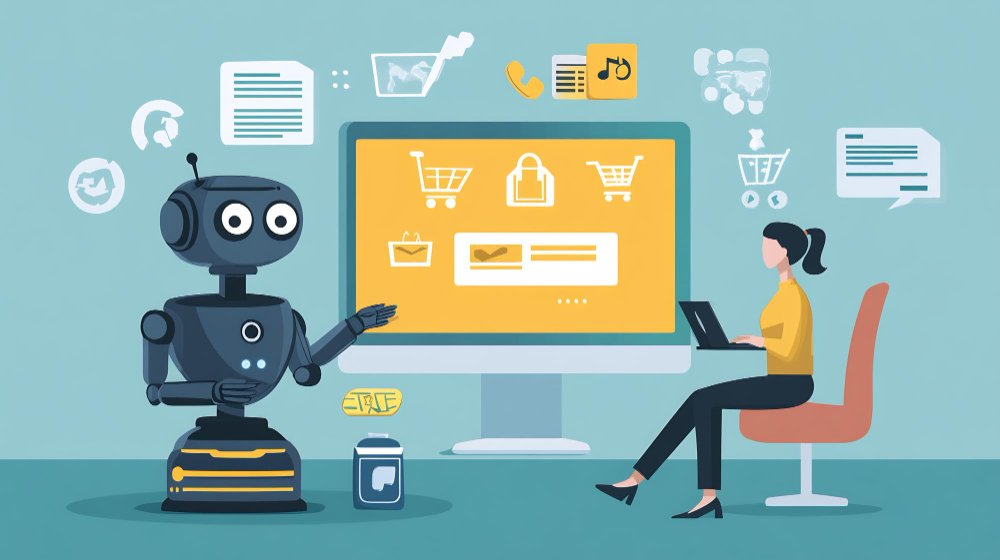Generative AI is basically taking over eCommerce right now, and honestly, it’s wild to watch. Old AI was all about crunching numbers and automating boring stuff, but this new wave? We’re talking about tech that can whip up fresh product descriptions, craft unique shopping experiences, and spit out marketing campaigns. They actually feel tailored to you, not just some generic template. Retailers are loving it because it means more personalized vibes for their customers, which, let’s be real, everyone wants. The whole industry is moving ahead, blending efficiency with creativity in ways that used to sound like sci-fi. Generative AI in eCommerce has proved itself as a transformative force redefining how customers discover, interact, and purchase in online marketplaces.
Generative AI in eCommerce: Why does it matter
Generative AI is totally shaking up the eCommerce game. Forget those boring, copy-paste product pages and the same old “Can I help you?” chatbot nonsense. Now, shops can blast out content that actually changes on the fly, tweaking layouts and recommendations so it feels like the store gets you. Every shopper’s feed looks a little different, kind of spooky, but honestly, it’s way more interesting than scrolling through the same stuff as everyone else. It means super-fast responses to customer inquiries. The role of AI in eCommerce has pushed its limits. eCommerce isn’t just about clicking “add to cart” anymore. It’s like the internet woke up, chugged a triple espresso, and decided to actually care about people.
Generative AI in eCommerce is not just lurking in the background; it’s out here, ensuring the shopping experiences are less like a chore and more like an experience. The bots are getting chatty, the recommendations are spooky accurate, and half the time you don’t even know you’re being gently herded toward checkout. Their expectations are wild these days. They want everything to feel smooth and custom, and honestly, it’s cool whether they’re on their phone, laptop, or yelling at their smart fridge.
Key Trends Shaping the eCommerce Industry
Generative AI in eCommerce is stepping up big time, rolling out stuff like virtual try-ons, chatty shopping assistants, and even stories about products. It’s changing how we mess around with brands and their stuff. Shopping’s not just a transaction now; it’s a whole experience (yeah, “customer journey,” but without the buzzword cringe). Honestly, if you’re running an eCommerce business and not jumping on this, you’re about to get left in the digital dust.
1. Generative AI Supercharges Content Creation
Generative AI is basically the secret weapon for content now. Product blurbs, snazzy email blasts, catchy web copy, and graphics that don’t look like they were made in MS Paint. It’s cranking out everything. By 2025, expect like 7 out of 10 companies to have some AI doing at least one real job. It’s probably in marketing first because that’s where the money’s at. If you thought AI was just about chatbots, buckle up, it’s coming for the creative gigs too.
Given the way that generative AI-generated content is providing companies the benefit of rapidly redesigning sites, executing seasonal campaigns faster than ever, and conducting real-time A/B tests, it is at a fraction of the cost and time long associated with traditional company services in these engagements. And unlike before, modern search engines (e.g., Google) will not penalize AI-generated content as long as it is of high quality. So, it is not a fad but rather a useful partner.
2. Hyper-Personalization Across the Customer Journey
Artificial intelligence personalization is now standard across all of the eCommerce channels. Customers can expect product recommendations when browsing sites, personalized emails, and remarketing with personalized ads. Artificial Intelligence can digest knowledge from browsing history, purchase history, and even abandoned carts to recommend personalized messages and products.
A 2024 Global Consumer Survey reported that 80% of customers are comfortable with, and the majority might expect, personalized experiences. This data-driven personalization increases engagement and conversion rates (you could have this as a point chart), and it gives each shopper a unique, “remembered” experience, resulting in long-term loyalty for the brand.
3. Conversational AI and Intelligent Agents
Conversational AI tools, like smart chatbots and voice-activated assistants, have progressed from simply answering standard FAQs to executing nuanced end-to-end customer journeys. While there has been an explosion of AI use in business, almost three-quarters of companies believe that applying AI agents offers a major competitive advantage.
Today’s AI agents can provide personalized shopping recommendations, provide customer support 24/7, and assist new employees with onboarding or training. This level of sophisticated AI-enabled support and service can generate significant efficiency while delivering equivalent quality to a human workforce to the same extent at far greater volume and lower cost.
4. Predictive AI and Digital Twins advancing smarter operations
Alright, let’s ditch the corporate-speak and get real. Predictive AI is like having a crystal ball for your web shop. It consumes random piles of data. Then it spits out guesses that are way smarter than any human hunch. Inventory? Handled. It’ll nudge you to restock before you even realize you’re running low. Customer churn? You’ll see it coming a mile away and maybe do something about it before folks jump ship.
Now, if you want to talk about the next level, let’s get into digital twins, which honestly sounds like sci-fi, but it’s already here. Basically, it’s your business in digital cosplay. You can mess with stuff, move warehouses, change supply chains, tweak your product line, and see how it’d play out before you risk real cash. It’s all about less waste, fewer surprise costs, and getting products out the door faster. You get to nerd out over all that juicy data. So yeah, AI isn’t just some buzzword; it’s turning eComm into a game of chess, not checkers.
5. AI-Based Cybersecurity and Trust
The emergence of AI provides additional threats along with promising solutions, putting eCommerce players at risk, as cybercriminals are applying intelligent attacks. Organizations will deploy AI-driven solutions focused on cybersecurity with the goal of detecting fraud, identifying phishing attempts, and assessing vulnerabilities in real time.
Tools that offer features like machine-learning analysis of fraud, diligence checks on transactions, and defensive checks against phishing attacks certainly can help all eCommerce players to keep ahead of threats. Not only does this help avoid losses and keep secure and confidential information away from cybercriminals, but it also helps build customer trust in a digital world of commerce.
Using these trends, generative AI is changing its path and pushing its limits in eCommerce. It enables hyper-efficiency, next-level personalized experiences, and robust business operations that help them gain a competitive edge.
Benefits of Generative AI in eCommerce
Generative AI is fostering a new age of ecommerce innovation; it is creating new systems that are more efficient and crafting customer shopping experiences that were previously unthinkable. Below you will find five of the most notable advantages, along with their descriptions and usages.
1. Target Marketing
Leveraging generative AI, eCommerce platforms can function in a much more efficient and effective manner. Online shopping experiences are no longer passive. With dynamic product displays and refined features that are suited to the consumer’s needs, eCommerce platforms can provide personalized shopping for every individual. Instead of the old and outdated generic automated suggestions, you are offered something far more suited and personalized to your tastes.
- Adaptive product recommendations based upon browsing data
- Personalized home page messaging and banners for each visitor
- Promotions in the email or ads on the web that are triggered by real-time actions
- Errors in pricing and offers are reduced by dynamic pricing and offers that evolve based on individual profiles
2. Automated Content Generation
Automating product descriptions, ad copy, pictures, and various other visual assets can save companies a lot of time and cost. Generative AI can generate descriptive, accurate, and creative content in many different styles and tones and assist organizations in keeping huge catalogs regularly updated and consistent.
- Automated generation of product titles, descriptions, and FAQs for a large number of SKUs. Offering personalized campaign content for seasonal marketing or sale campaigns
- Creation of images and videos for virtual try-ons or product demonstrations
- Improved product adaptation for different regions
3. Enhanced Product Discovery
Generative AI in eCommerce powers the way customers search and discover products by removing obstacles and increasing the chances of a purchase. Visual search, semantic search, and interactive filtering allow customers to find products quickly and easily, even from an image or a phrase.
- Visual search allows users to find products by uploading images.
- Conversational search interfaces that understand and respond to natural speech.
- Intelligent, context-sensitive filters that dynamically fine-tune suggestions.
- Cross-platform suggestions to make shoppers aware of other products.
4. Enhanced Customer Support
Generative AI in eCommerce can basically provide customer service twenty-four-seven and is capable of answering requests and complicated multi-turn, human-like interactions with personalized and empathetic responses. These AI service representatives can assist in making customers happier by shortening wait times; they offer the same level of service quality every time.
- AI service chatbots and virtual agents work to assist customers with their needs before and after they have made a purchase.
- AI chatbots and service agents can support customers in many languages for customers across the globe.
- You will automatically receive information updates on the status of your order, any delays, or returns.
- Tougher problems get passed to human agents. These agents get all the details needed beforehand.
5. Making Things Run Better and Saving Money
Generative AI enables features like managing inventory and spotting fraud. You save money, and things run smoother; simple as that. Predictive analytics? That’s like giving your logistics team a crystal ball. Suddenly, you’re not just hoping you guessed the right inventory; you actually know what people want before they do. This means less extra stock and fewer times when things are sold out.
- Automatic fraud detection flags suspicious activity.
- Supply chain and pricing can be automated. This helps get the best profit margins.
- Operational costs go down because different departments work more smoothly.
Using these features helps a company improve its services. It also gets them ready for long-term growth and new ideas. This is really important when you’re competing in e-commerce. An AI software development company can fast-track this change by offering tailor-made AI tools.
Future Outlook: Generative AI in eCommerce
Generative AI will reshape the future of eCommerce in ways that are foundational for digital retail. The Business Research Company says generative AI in eCommerce investments should really grow a lot in the next ten years. It’s expected to jump from $1.04 billion in 2025 to over $2 billion by 2029. That’s a yearly growth rate of more than 18%.
This technology will let retailers do more than just automate things. It’s ushering in a new age for creative, independent, and eco-friendly online shopping. AI solutions will affect all parts of the customer experience. This includes how companies work behind the scenes and how brands are built and trusted by customers.
The future trends of generative AI in eCommerce to look out for include
- Autonomous eCommerce
AI agents will significantly influence the entire shopping journey. From demand prediction and smart product bundling to dynamic pricing and automated customer support, AI systems will autonomously curate, sell, and deliver goods with minimal human supervision. Merchandising will be entirely hands-free, and restocking or personalized offers will happen automatically to maximize lifetime customer value.
Also Read: Top AI Development Companies
- Sustainable and Responsible AI:
Data centers that power AI workloads really need to be more efficient. We’ll train energy-efficient AI models during times when there’s less carbon in the grid. AI will also help with logistics, cutting down on shipping waste and our overall footprint. Brands should really focus on using AI ethically. They also need to be clear about how they handle data.
- Hyper-Personalization and Experiential Commerce:
The next big thing with Generative AI in eCommerce will let us create experiences that are super personal. As multimodal models get better, customers will be able to shop by voice and images and even try on virtually. Yes, customers get recommendations and content that actually fit them, not just some cookie-cutter spam. Imagine AI stylists picking outfits for you, digital avatars showing you how those jeans look, and shopping interfaces that almost feel like a game. The primary difference between shopping online and in-store? It’s about to get really blurry, and honestly, way more fun.
Generative AI in eCommerce isn’t just some boring backend tool; it’s about to redefine what shopping even means. The future of eCommerce? It’s going to be slick, super-personalized, and probably a little addictive. Automation and innovation are about to get a glow-up, and honestly, I’m here for it.
The Bottom Line
If you still consider generative AI in eCommerce as a distant possibility, you are still living years behind. It is an active force shaping the way businesses and customers interact. Whether it is hyper-personalized shopping journeys or predictive operations, it is influencing everything. With the rise in consumer expectations, embracing AI will gain its identity not as an advantage but as a necessity. Leading companies seeking to adapt future-proof solutions are already exploring ways to combine creativity, automation, and intelligence into daily business processes. Collaborating with an ideal eCommerce software development company enables brands to balance innovation with current world trends.
Related Reads
- Custom Fitness App Development: Build the Fitness App Your Users Actually Want
- Unplug and Reboot: What a 5-Day Yoga Retreat Taught Me About True Freedom
- Bulk Eucalyptus Steam – Pure Botanical Relief for Spa-Like Showers
- Ride The Future of Water Sports with Ewavesurf’s Electric Jet Powered Surfboard
- Sofa By Day, Dreamland By Night: The Magic of a Convertible Couch
- Top Robotic Process Automation Services Chosen by Leading Entrepreneurs



